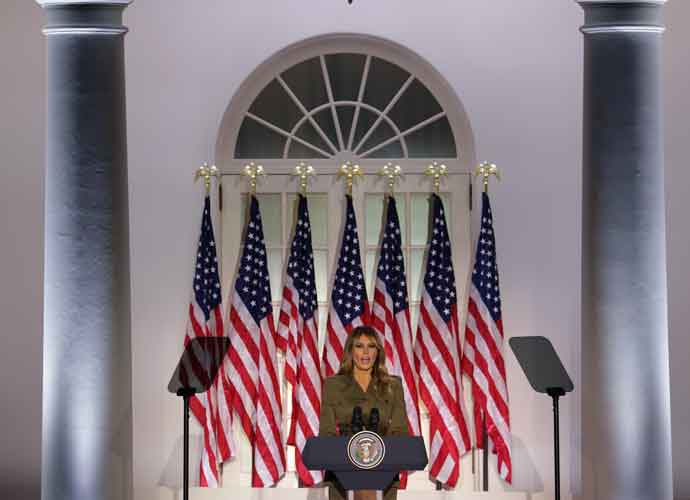

WASHINGTON, DC - AUGUST 25: U.S. first lady Melania Trump addresses the Republican National Convention from the Rose Garden at the White House on August 25, 2020 in Washington, DC. The convention is being held virtually due to the coronavirus pandemic but will include speeches from various locations including Charlotte, North Carolina and Washington, DC. (
President Donald Trump‘s usage of the White House as the setting for his Republican National Convention speech has prompted concerns about potential violations of the Hatch Act.
The 1939 law prohibits federal employees from engaging in specific partisan political activities while on duty or on government property. While the rule excludes the president and vice president, it was unclear how any employee assisting in the set-up of the RNC would not be in violation of the act.
The U.S. Office of Special Counsel wrote in a letter that Trump may deliver his nomination acceptance at the White House because “the President and Vice President are not covered by any of the provisions of the Hatch Act.” The office did note that employees would not legally be allowed to assist in the event, writing that since the employees “are covered by the Hatch Act, so there may be Hatch Act implications for those employees, depending on their level of involvement with the event and their position in the White House.”
White House spokesman, Judd Deere, said the administration will follow the Hatch Act and that “RNC convention events will be planned and executed, at whatever the venue, by the Trump campaign and RNC.”
Subscribe to our free weekly newsletter!
A week of political news in your in-box.
We find the news you need to know, so you don't have to.
“Any government employees who may participate will do so in compliance with the Hatch Act,” he added.
Trump will accept the Republican nomination Thursday from the South Lawn, a location that some Republicans argue is not included in the scope of the Hatch Act since it is not considered a federal building, but rather a part of Trump’s residence.
However, even if the South Lawn is exempt from the requirement, Trump still used rooms in the White House as backdrops for certain round-tables Monday, in addition to showing clips filmed in the White House on the first night of the RNC.
Jonathan Ladd, an associate professor from Georgetown noted on Twitter that it would be illegal for any White House staffer to help film or create the film segments featured.
“It’s still illegal under the Hatch Act for any White House staffer to participate in executing a campaign photo op/video segment in the White House,” Ladd wrote. “The law still matters. It should be enforced.”
Another potential concern regarding the Hatch Act is that the president’s daughter and White House adviser Ivanka Trump will be speaking prior to her father.
The Hatch Act would extend to her as an adviser, but the White House ensured that she will be speaking in her “personal capacity.”
While the use of the White House to accept a party nomination is unconventional, Trump will not be the first sitting president to do so. President Franklin D. Roosevelt delivered his own acceptance speech in 1940 via radio after being nominated for a third term.
On Monday, House Speaker Mike Johnson stated that the House will not vote on releasing…
On July 4, President Donald Trump signed his Big Beautiful Bill into law, which takes…
The House Oversight Committee is set to subpoena Jeffrey Epstein’s former partner, Ghislaine Maxwell, after…
Former Sen. Joe Manchin (I-West Virginia) has vocalized his displeasure with the Democratic Party shifting…
White House Press Secretary Karoline Leavitt has announced that the White House is removing the…
After filing a lawsuit against Florida Gov. Ron DeSantis (R) for denying inspections to a…